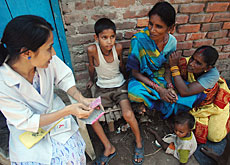
Aids cases drop mainly due to poor data

The United Nations has reduced its estimates of how many people are infected with the Aids virus, from nearly 40 million to 33 million.
The revised estimates on HIV in India account for a large part of the decrease. The Swiss health authorities say the downward revision was to be expected.
The UN Aids agency admitted it overestimated how many people were infected with the incurable virus, and said better methods of collecting data showed it was not quite as common as feared.
“The single biggest reason for this reduction was the intensive exercise to assess India’s HIV epidemic, which resulted in a major revision of that country’s estimates,” the UN said in a report to be published on Wednesday.
After originally estimating some 5.7 million people were infected in India, the UN more than halved that estimate, to 2.5 million.
But the numbers nonetheless show the epidemic is overwhelming and that efforts to fight HIV must still be stepped up, said officials at the UN agency.
Roger Staub, head of the Swiss Federal Health Office’s Aids unit, said a review of the figures notably from India was to be expected.
“It remains extremely difficult to gather precise data on Aids and HIV in emerging countries and in the developing world,” he told swissinfo.
Switzerland
There are about 30,000 people in Switzerland who were tested positive for HIV between 1985 and 2006. There were also 8,418 Aids cases reported between 1983 and 2006.
Staub says one of the biggest concerns for the health authorities remains the spread of the epidemic among gay men in Switzerland.
He repeated a call for more concerted action and the monitoring of measures taken, instead of well-meaning words.
“I hope the European Union will set up an international panel to ensure the numerous declarations will eventually have an impact in the fight against Aids.”
Asia and Africa
Peter Piot, executive director of the UN Aids programme, said in a statement that new HIV infections and mortality were declining, while the prevalence was levelling.
“Unquestionably, we are beginning to see a return on investment,” he said in a statement.
“But with more than 6,800 new infections and over 5,700 deaths each day due to Aids, we must expand our efforts worldwide.”
The new numbers suggest that about 33.2 million people are infected with the human immunodeficiency virus – about 30.8 million adults and 2.5 million children.
The UN estimated that 1.7 million people became newly infected in sub-Saharan Africa this year, a significant reduction since 2001.
But Africa remains by far the continent hardest hit by Aids, with 22.5 million people infected with HIV. Eight countries there now account for almost one-third of all new HIV infections and Aids deaths globally.
“In Asia, the estimated number of people living with HIV in Vietnam has more than doubled between 2000 and 2005 and Indonesia has the fastest growing epidemic,” the report says.
The number of new HIV infections each year likely peaked in the late 1990s at three million and was estimated at 2.5 million for 2007, according to the UN.
It also changed its estimate on how long it takes to die from Aids if not treated from nine years to 11 years.
swissinfo with agencies
According to the Federal Health Office, nearly 30,000 men and women were tested positive with HIV in Switzerland between 1985 and 2006.
Estimated number of new infections per year: 750-800.
The number of new infections increased significantly among homosexual men between 2004 and 2006, but dropped among other groups.
Between 1983 and 2006, 8,418 people were diagnosed with Aids, of whom 235 died in 2005 and 165 in 2006.
To date, 5,671 people have died from Aids in Switzerland.

In compliance with the JTI standards
More: SWI swissinfo.ch certified by the Journalism Trust Initiative




























You can find an overview of ongoing debates with our journalists here . Please join us!
If you want to start a conversation about a topic raised in this article or want to report factual errors, email us at english@swissinfo.ch.